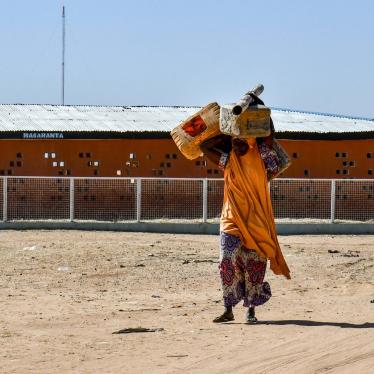(New York) - Uganda should immediately halt the forced repatriation of Rwandan refugees and asylum seekers from two camps on its southwestern border with Rwanda, Human Rights Watch said today.
"Mass forcible return of refugees and asylum seekers fundamentally violates Uganda's international obligations," said Bill Frelick, director of Human Rights Watch's Refugee Program. "The Ugandan government is supposed to protect people seeking asylum in Uganda, not endanger them."
The operation took place in the context of increasing pressure by Rwanda on neighboring countries to return refugees to Rwanda. Such pressure has steadily increased in recent months, leading to fears of further forced repatriations.
On July 14 and 15, 2010, Ugandan police rounded up more than 1,700 Rwandans, including recognized refugees, in the Nakivale and Kyaka camps and forcibly sent them back to Rwanda. There were reports that Rwandan police were present during the operation.
Ugandan officials reportedly deceived the Rwandans into gathering around trucks by announcing a food distribution, as well as information on the outcome of asylum appeals. Police and camp commanders then forced the Rwandans onto the trucks at gunpoint. In the ensuing panic, during which shots were fired, at least 25 people were injured.
Two persons died, reportedly after jumping off trucks in an attempt to escape the forced removal. A number of children were separated from their parents.
According to the United Nations High Commissioner for Refugees (UNHCR), the Rwandan and Ugandan governments jointly organized the forced repatriation and bypassed the UN agency. UNHCR also reported that its staff were told to leave the camps when officials began rounding up the Rwandans.
On July 15, UNHCR received a letter from the Rwandan minister for disaster preparedness and refugee affairs, informing the agency that the Rwandan government intended to take over a transit center previously used by UNHCR so that the government could receive the returnees. The Rukomo transit center in Byumba, northern Rwanda, has the capacity for only a few hundred people and lacks the facilities to provide for the basic needs of a larger number.
Tarsis Kabwegyere, the Ugandan minister in charge of disaster preparedness and refugees, has been quoted in the media as claiming that only rejected asylum seekers were sent back. However, witnesses to the operation said that no effort was made to distinguish among those forced onto the trucks, and that those sent back included individuals who had gained refugee status. The UN High Commissioner for Refugees issued a statement confirming that "recognized refugees were among those returned."
Human Rights Watch urged the Ugandan government to ensure that all Rwandan asylum seekers remaining in Uganda have access to a fair individual procedure that determines their refugee status and respects their rights.
Uganda is home to more than 15,000 Rwandan refugees, according to the UN refugee agency. Some fled Rwanda in the aftermath of the 1994 genocide; others arrived more recently, including in 2009 and 2010. Most live in Nakivale and Kyaka, in difficult conditions. In recent months, they have been denied access to land to cultivate crops, as part of a series of measures to persuade them to return to Rwanda.
Uganda has rejected 98 percent of asylum applications from Rwandans this year, according to UNHCR. However, many Rwandan asylum seekers contend that it is not safe for them to go home, citing fears about the justice system (particularly community-based gacaca courts responsible for trying genocide cases), land disputes, and political repression.
The Rwandan government has long sought the return of Rwandan refugees from neighboring countries and has exerted pressure on governments in the region to cooperate in repatriations. In addition to Uganda, both Burundi and Tanzania have forcibly returned refugees to Rwanda without considering their individual cases on several occasions over the last few years.
Human Rights Watch has documented patterns of serious human rights violations in Rwanda, including increased insecurity and political repression in the period leading up to presidential elections on August 9 and concerns about the justice system.
"This operation by the Rwandan and Ugandan governments completely disregards the rights of refugees who have well-founded fears of returning to Rwanda," Frelick said. "These events are going to cause panic among Rwandan refugees and asylum seekers remaining in Uganda and in other neighboring countries that they too may be forced back against their will."







